Uvi Poznansky's Blog, page 99
December 20, 2017
This is no fairytale. It is happening here and now
My historical fiction trilogy, The David Chronicles, presents a surprising contrast before you: the story harkens back to biblical times—yet by design, it is expressed in modern language. Why? Because such is my way to suggest to you that this is no fairytale. It is happening here and now. I invite you to step into the skin of my character, become David, and look yourself in the mirror.
Readers often ask me, "Were you quoting the bible or paraphrasing? I’m used to read the King James version, and I'm certain you aren’t." To which I say, “All the English versions—King James included—are translations. Therefore, they are interpretations of the original Hebrew, in which I am versed to the point of knowing it by heart.”
In this trilogy, the choice of modern language is intentional. The entire book is greatly informed by art through the ages, including modern art, which adds multiple viewpoints to every moment in the story. This artistic versatility is reflected in my writing. Here is but one example, that was inspired inspired by a painting of David and Bathsheba by Chagall:
I try to take control of my desire by playing my lyre and writing poetry, but notes and words fail me. Everything I compose these days seems to be but a pale shadow of a shadow of what Bathsheba means to me. And the one image that keeps coming back to me is our reflection in the glass, where our faces melded into one. My eye, her eye, and around us, the outline of a new, fluid identity. A portrait of our love, rippling there, across the surface of the wine.
I feel great responsibility for all my characters. My utmost wish is to convey their voices and their experiences in a faithful manner. However I take none of them as a sacred, perfect figure, which to my surprise may offend some readers. Please keep in mind, I do not claim my story as gospel.
To me, perfect characters are boring and unreal. I am interested in mining the internal conflicts in their souls. In an era of cruelty, when destroying the enemy is deemed a divine directive, David’s search for a path to power leads him in ways that are, at times, scandalous. Notorious for his contradictions, he is seen by others as a gifted court entertainer, a successful captain in Saul’s army, a cunning fugitive, a traitor leading a gang of felons, and a ruthless raider of neighboring towns who leaves no witnesses behind.
How does he see himself, during the first phase of his life? With his hands stained with blood, can he find an inner balance between conflicting drives: his ambition for the crown, his determination to survive the conflict with Saul, and his longing for purity, for a touch of the divine, as expressed so lyrically in his psalms and music?
Not only is David a conflicted character, striving to find his better self—but so are other characters, each bearing her anguish. Take Michal, daughter of king Saul, as an example. My story springs out of very few lines given to her in the bible. You may remember that when David dances in front of the arc, she despises him in her heart. Such is the bitterness of love that has turned to hate.
In the first volume of the trilogy, titled Rise to Power, Michal is a tragically conflicted figure. Because of her royal upbringing, her pride makes her look down upon David. To her he is an outsider and a commoner. And yet, in spite of herself, her heart is consumed by love for him. She is doomed, in the end, not to have children. This is something I explore from the beginning of their relationship. Here is a glimpse of how he sees her on their wedding night:
I glance at her as she climbs up over me into her bed and tucks herself under the blankets, and I remember what Joav told me about girls, just a few days ago. It’s all just flesh, he said, no matter how fancy their garments. In bed, they’re all the same. I must tell him he made a mistake. This girl is different.With her narrow hips and her flat belly, which is matched by an equally flat chest, Michal looks like a boy. And trapped in that skinny body, pounding there with palpable longing, is the heart of a woman, a proud woman, cursed with love.
What I want most of all is for the characters that have sprung from my mind onto the paper to continue their journey, and spring from the paper into your mind. That, for me, would be the best reward.
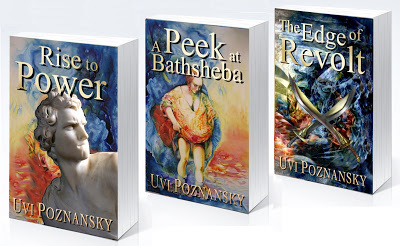
★ Love Reading? Treat yourself to a gift ★
Volume I: Rise to PowerEbook: Kindle ★ Nook ★ Apple ★ Kobo ★ Google Play ★ SmashwordsPaperback: Amazon ★ Barnes&NobleAudiobook: iTunes ★ Amazon ★ Audible
Volume II: A Peek at BathshebaEbook: Kindle ★ Nook ★ Apple ★ Kobo ★ Google Play ★ SmashwordsPaperback: Amazon ★ Barnes&NobleAudiobook: iTunes ★ Amazon ★ Audible
Volume III: The Edge of RevoltEbook: Kindle ★ Nook ★ Apple ★ Kobo ★ Google Play ★ SmashwordsPaperback Amazon ★ Barnes&NobleAudiobook: Amazon ★ Audible ★ iTunes
The complete trilogy:The David Chronicles (Boxed Set) Ebook: Kindle ★ Apple ★ Nook ★ Kobo ★ Smashwords
Readers often ask me, "Were you quoting the bible or paraphrasing? I’m used to read the King James version, and I'm certain you aren’t." To which I say, “All the English versions—King James included—are translations. Therefore, they are interpretations of the original Hebrew, in which I am versed to the point of knowing it by heart.”
In this trilogy, the choice of modern language is intentional. The entire book is greatly informed by art through the ages, including modern art, which adds multiple viewpoints to every moment in the story. This artistic versatility is reflected in my writing. Here is but one example, that was inspired inspired by a painting of David and Bathsheba by Chagall:
I try to take control of my desire by playing my lyre and writing poetry, but notes and words fail me. Everything I compose these days seems to be but a pale shadow of a shadow of what Bathsheba means to me. And the one image that keeps coming back to me is our reflection in the glass, where our faces melded into one. My eye, her eye, and around us, the outline of a new, fluid identity. A portrait of our love, rippling there, across the surface of the wine.
I feel great responsibility for all my characters. My utmost wish is to convey their voices and their experiences in a faithful manner. However I take none of them as a sacred, perfect figure, which to my surprise may offend some readers. Please keep in mind, I do not claim my story as gospel.
To me, perfect characters are boring and unreal. I am interested in mining the internal conflicts in their souls. In an era of cruelty, when destroying the enemy is deemed a divine directive, David’s search for a path to power leads him in ways that are, at times, scandalous. Notorious for his contradictions, he is seen by others as a gifted court entertainer, a successful captain in Saul’s army, a cunning fugitive, a traitor leading a gang of felons, and a ruthless raider of neighboring towns who leaves no witnesses behind.
How does he see himself, during the first phase of his life? With his hands stained with blood, can he find an inner balance between conflicting drives: his ambition for the crown, his determination to survive the conflict with Saul, and his longing for purity, for a touch of the divine, as expressed so lyrically in his psalms and music?
Not only is David a conflicted character, striving to find his better self—but so are other characters, each bearing her anguish. Take Michal, daughter of king Saul, as an example. My story springs out of very few lines given to her in the bible. You may remember that when David dances in front of the arc, she despises him in her heart. Such is the bitterness of love that has turned to hate.
In the first volume of the trilogy, titled Rise to Power, Michal is a tragically conflicted figure. Because of her royal upbringing, her pride makes her look down upon David. To her he is an outsider and a commoner. And yet, in spite of herself, her heart is consumed by love for him. She is doomed, in the end, not to have children. This is something I explore from the beginning of their relationship. Here is a glimpse of how he sees her on their wedding night:
I glance at her as she climbs up over me into her bed and tucks herself under the blankets, and I remember what Joav told me about girls, just a few days ago. It’s all just flesh, he said, no matter how fancy their garments. In bed, they’re all the same. I must tell him he made a mistake. This girl is different.With her narrow hips and her flat belly, which is matched by an equally flat chest, Michal looks like a boy. And trapped in that skinny body, pounding there with palpable longing, is the heart of a woman, a proud woman, cursed with love.
What I want most of all is for the characters that have sprung from my mind onto the paper to continue their journey, and spring from the paper into your mind. That, for me, would be the best reward.

★ Love Reading? Treat yourself to a gift ★
Volume I: Rise to PowerEbook: Kindle ★ Nook ★ Apple ★ Kobo ★ Google Play ★ SmashwordsPaperback: Amazon ★ Barnes&NobleAudiobook: iTunes ★ Amazon ★ Audible
Volume II: A Peek at BathshebaEbook: Kindle ★ Nook ★ Apple ★ Kobo ★ Google Play ★ SmashwordsPaperback: Amazon ★ Barnes&NobleAudiobook: iTunes ★ Amazon ★ Audible
Volume III: The Edge of RevoltEbook: Kindle ★ Nook ★ Apple ★ Kobo ★ Google Play ★ SmashwordsPaperback Amazon ★ Barnes&NobleAudiobook: Amazon ★ Audible ★ iTunes
The complete trilogy:The David Chronicles (Boxed Set) Ebook: Kindle ★ Apple ★ Nook ★ Kobo ★ Smashwords
Published on December 20, 2017 21:39
The flash of her gold earring
I leaned over the railing of the pier, and for a second hoped he would see me. How could he not, with my hair flaming red, and blowing, long and wild, in the winter wind, which swept across the divide? Now I could see the girl sitting there, opposite him. She raised her glass and clinked it against his, then cuddled up to him, like, to whisper something up close, in his ear. I don’t hardly know if there was something odd with the air, which stirred past me with cloud after cloud of salty mist; or the sheet of glass over there, which must have had some flaws all over it; or the mirror image of sunset, which buckled out of shape, in and out of the flaws; or else, was it the film of tears, which formed in my eyes; or the sorrow, which came in like a tide, to wash over me—but in a blink, everything blurred. Everything started swimming in front of me: like, the shadow of her little black dress, the flash of her gold earring, even the blond streaks in her hair. All of them things, which lived on the other side of the layers—the layer of mist, and of glass, and flaws, tears, wash—they all rippled a bit and then, settled into a haze. I blinked again and at once, things went back to the way things should be—except that the girl was still there, by his side, where I should have been, had I not left him.
Anita in My Own Voice
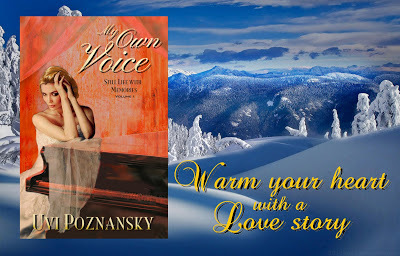
★ Love reading? Treat yourself to a gift ★Still Life with Memories
Volume I: My Own VoiceEbook: Kindle ★ Nook ★ Apple ★ Kobo ★ Google Play ★ SmashwordsPaperback: Amazon ★ Barnes&NobleAudiobook: iTunes ★ Amazon ★ Audible
Volume II: The White PianoEbook: Kindle ★ Nook ★ Apple ★ Kobo ★ Google Play ★ SmashwordsPaperback: Amazon ★ Barnes&NobleAudiobook: iTunes ★ Amazon ★ Audible
Volume I & II, woven together: Apart from LoveEbook: Kindle ★ Nook ★ Apple ★ Kobo ★ Google Play ★ SmashwordsPaperback: Amazon ★ Barnes&NobleAudiobook: iTunes ★ Amazon ★ Audible

"So much more could be said... but that would be robbing the reader of the joy of discoveries that Poznanasky accomplishes in this profound novel." - Grady Harp, HALL OF FAME reviewer
Anita in My Own Voice

★ Love reading? Treat yourself to a gift ★Still Life with Memories
Volume I: My Own VoiceEbook: Kindle ★ Nook ★ Apple ★ Kobo ★ Google Play ★ SmashwordsPaperback: Amazon ★ Barnes&NobleAudiobook: iTunes ★ Amazon ★ Audible
Volume II: The White PianoEbook: Kindle ★ Nook ★ Apple ★ Kobo ★ Google Play ★ SmashwordsPaperback: Amazon ★ Barnes&NobleAudiobook: iTunes ★ Amazon ★ Audible
Volume I & II, woven together: Apart from LoveEbook: Kindle ★ Nook ★ Apple ★ Kobo ★ Google Play ★ SmashwordsPaperback: Amazon ★ Barnes&NobleAudiobook: iTunes ★ Amazon ★ Audible

"So much more could be said... but that would be robbing the reader of the joy of discoveries that Poznanasky accomplishes in this profound novel." - Grady Harp, HALL OF FAME reviewer
Published on December 20, 2017 20:06
December 16, 2017
There she is, my queen of the night
If you can not see this chirbit, listen to it here https://chirb.it/ApMqdv
What draws me to the story of David?
It is not religious reverence that draws me to the story. Rather, it is the drama of his life, which my trilogy, The David Chronicles, explores from youth to old age. I find it amazing to be in his skin over a lifetime of loves and wars, and I hope you will too.
His struggle is one that we can all feel inside us. Can he find an inner balance between conflicting drives: his ambition for the crown, his determination to survive the conflict with Saul, and his longing for purity, for a touch of the divine, as expressed so lyrically in his psalms and music?.
David is famous for bringing his kingdom from the brink of annihilation to a prosperous age, a renaissance. With all his gifts, he is indeed a renaissance man. This is his story as you have never heard it before: from the king himself, telling the unofficial version, the one he never allowed his court scribes to recount. In his mind, history is written to praise the victorious—but at the last stretch of his illustrious life, he feels an irresistible urge to tell the truth. In the first volume of the series, David gives you a fascinating account of his early years, culminating with a tribal coronation. Rooted in ancient lore, his is a surprisingly modern memoir.
What's different about my writing style?
I would describe my writing style as layered, much like Lasagna, with each layer having a different flavor and a different texture that complements the entire dish. How do I achieve this? The process, for me, is very similar to the way I sculpt: I shape the clay, then go around the unfinished piece and view it from an unexpected direction, in various lights, sometimes in the morning, sometimes at night, so as to achieve an effect that works well for me. Similarly when I write, I shape my text several times, each time refining it with a different idea, different principle in mind. For example, one such idea would be this: the end of a paragraph leaves gap of silence before the next paragraph begins, so end it on the strongest word so it continues to linger, continues to resonate with you.
What's unique about my writing process?
As an artist, I find great inspiration in art throughout the ages, describing each moment in the life of my character, and exhibiting different attitudes towards him. Often I create a scene that is a vivid expression of a particular piece of art.
Take, for example, the cover of A Peek at Bathsheba (volume II of The David Chronicles.) My book, A Peek at Bathsheba, includes a sighting of Bathsheba at the mouth of a cave, located just above the Kidron valley, near Jerusalem. The setting immediately brought to my mind A Woman Bathing in a Stream, painted in 1655 by Rembrandt, immediately after he painted Bathsheba at Her Bath.
During the history of art, most artists portrayed Bathsheba as a fleshy, mature woman. They often placed her in a lush outdoor scenery, such as a royal garden, with flowing water or with a fountain. Spotting a forbidden woman in a setting reminiscent of the Garden of Eden is a tempting fantasy, and quite a departure from the biblical account, that states she was bathing on her roof. Artists go after their own heart—and so, indeed, do writers—to suggest the emotional essence of the story.
Rembrandt places his figure not in a garden, but in a cave with a pool of water, which is at once an outdoor and indoor scene (and in Bathsheba at Her Bath he presented her in an indoor scene, in her bedroom.) He worked mostly with a grays, browns, and blacks, setting objects back by plunging them into this dark tone, and bringing them forward by shining a bright light directly upon them, creating stark contrasts. The resulting image is sculptural in nature, and strikingly dramatic.
Clearly, the composition of my watercolor painting is inspired by his admirable art, shares a similar spirit of intimacy, and maintains a loving respect for the model. Here is my approach, my homage to it, which illuminates the new vision I use for the story.
I strive to maintain a sculptural feel for Bathsheba, but take the freedom to play with a splash of colors, so as to draw contrasts between cool and warm hues. I create a variety of textures, using a loose, spontaneous brushstroke. This I achieve by applying puddles of pigments over Yupo paper, which (unlike traditional watercolor paper) is non-absorbent. I let these puddles drip in some places, and in other places, I lift and shape them into careful designs, using various tools.
And here is an excerpt describing the cave scene in A Peek of Bathsheba:
Watching the cracks in the rock I listen how water gurgles underneath them, how it comes, siphoned out with a big, sudden splatter—only to be swallowed back once again. Such is the ebb and flow of life. Climbing up I imagined the view I would have up there, at the top of the world. And now, having achieved victory, I am beginning to come down, seeking reflection. From outside the cave comes the hoot of an owl. Outlined against a dreamy moonlight, it strikes an upright stance, and turns its large, broad head to face me. Its gaze meets mine. At the moment I feel a strange affinity to this bird of prey. Like me, it must cherish its solitude.And as it spreads its feathers I think I see out there, behind the flutter, a curvaceous outline of a nude. I ache to touch her flesh. It is glowing with warm, reddish hues of terra-cotta. Her breasts are tipped with gold. As if springing to life out of some Babylonian plaque, there she stands, surrounded by owls. There she is, my Queen of the Night.“Bathsheba,” I whisper. My voice gets lost in the vacuous space. A moment later, the owl takes off. It rises away in its silent flight, and the illusive light of the moon starts dimming out.
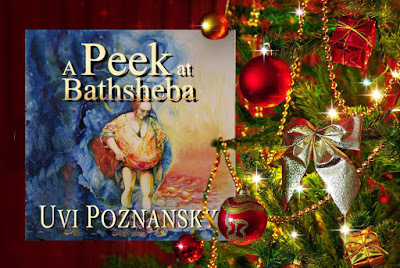
★ Love Reading? Treat yourself to a gift ★
Volume I: Rise to PowerEbook: Kindle ★ Nook ★ Apple ★ Kobo ★ Google Play ★ SmashwordsPaperback: Amazon ★ Barnes&NobleAudiobook: iTunes ★ Amazon ★ Audible
Volume II: A Peek at BathshebaEbook: Kindle ★ Nook ★ Apple ★ Kobo ★ Google Play ★ SmashwordsPaperback: Amazon ★ Barnes&NobleAudiobook: iTunes ★ Amazon ★ Audible
Volume III: The Edge of RevoltEbook: Kindle ★ Nook ★ Apple ★ Kobo ★ Google Play ★ SmashwordsPaperback Amazon ★ Barnes&NobleAudiobook: Amazon ★ Audible ★ iTunes
The complete trilogy:The David Chronicles (Boxed Set) Ebook: Kindle ★ Apple ★ Nook ★ Kobo ★ Smashwords

"Written with the artistic grace that is her signature style. She writes with a calm, steady hand that plucks the strings of her tale with lyrical precision that leaves the reader deeply entrenched in her words long after the last page." -Dii, Top 500 reviewer
What draws me to the story of David?
It is not religious reverence that draws me to the story. Rather, it is the drama of his life, which my trilogy, The David Chronicles, explores from youth to old age. I find it amazing to be in his skin over a lifetime of loves and wars, and I hope you will too.
His struggle is one that we can all feel inside us. Can he find an inner balance between conflicting drives: his ambition for the crown, his determination to survive the conflict with Saul, and his longing for purity, for a touch of the divine, as expressed so lyrically in his psalms and music?.
David is famous for bringing his kingdom from the brink of annihilation to a prosperous age, a renaissance. With all his gifts, he is indeed a renaissance man. This is his story as you have never heard it before: from the king himself, telling the unofficial version, the one he never allowed his court scribes to recount. In his mind, history is written to praise the victorious—but at the last stretch of his illustrious life, he feels an irresistible urge to tell the truth. In the first volume of the series, David gives you a fascinating account of his early years, culminating with a tribal coronation. Rooted in ancient lore, his is a surprisingly modern memoir.
What's different about my writing style?
I would describe my writing style as layered, much like Lasagna, with each layer having a different flavor and a different texture that complements the entire dish. How do I achieve this? The process, for me, is very similar to the way I sculpt: I shape the clay, then go around the unfinished piece and view it from an unexpected direction, in various lights, sometimes in the morning, sometimes at night, so as to achieve an effect that works well for me. Similarly when I write, I shape my text several times, each time refining it with a different idea, different principle in mind. For example, one such idea would be this: the end of a paragraph leaves gap of silence before the next paragraph begins, so end it on the strongest word so it continues to linger, continues to resonate with you.
What's unique about my writing process?
As an artist, I find great inspiration in art throughout the ages, describing each moment in the life of my character, and exhibiting different attitudes towards him. Often I create a scene that is a vivid expression of a particular piece of art.
Take, for example, the cover of A Peek at Bathsheba (volume II of The David Chronicles.) My book, A Peek at Bathsheba, includes a sighting of Bathsheba at the mouth of a cave, located just above the Kidron valley, near Jerusalem. The setting immediately brought to my mind A Woman Bathing in a Stream, painted in 1655 by Rembrandt, immediately after he painted Bathsheba at Her Bath.
During the history of art, most artists portrayed Bathsheba as a fleshy, mature woman. They often placed her in a lush outdoor scenery, such as a royal garden, with flowing water or with a fountain. Spotting a forbidden woman in a setting reminiscent of the Garden of Eden is a tempting fantasy, and quite a departure from the biblical account, that states she was bathing on her roof. Artists go after their own heart—and so, indeed, do writers—to suggest the emotional essence of the story.
Rembrandt places his figure not in a garden, but in a cave with a pool of water, which is at once an outdoor and indoor scene (and in Bathsheba at Her Bath he presented her in an indoor scene, in her bedroom.) He worked mostly with a grays, browns, and blacks, setting objects back by plunging them into this dark tone, and bringing them forward by shining a bright light directly upon them, creating stark contrasts. The resulting image is sculptural in nature, and strikingly dramatic.
Clearly, the composition of my watercolor painting is inspired by his admirable art, shares a similar spirit of intimacy, and maintains a loving respect for the model. Here is my approach, my homage to it, which illuminates the new vision I use for the story.
I strive to maintain a sculptural feel for Bathsheba, but take the freedom to play with a splash of colors, so as to draw contrasts between cool and warm hues. I create a variety of textures, using a loose, spontaneous brushstroke. This I achieve by applying puddles of pigments over Yupo paper, which (unlike traditional watercolor paper) is non-absorbent. I let these puddles drip in some places, and in other places, I lift and shape them into careful designs, using various tools.
And here is an excerpt describing the cave scene in A Peek of Bathsheba:
Watching the cracks in the rock I listen how water gurgles underneath them, how it comes, siphoned out with a big, sudden splatter—only to be swallowed back once again. Such is the ebb and flow of life. Climbing up I imagined the view I would have up there, at the top of the world. And now, having achieved victory, I am beginning to come down, seeking reflection. From outside the cave comes the hoot of an owl. Outlined against a dreamy moonlight, it strikes an upright stance, and turns its large, broad head to face me. Its gaze meets mine. At the moment I feel a strange affinity to this bird of prey. Like me, it must cherish its solitude.And as it spreads its feathers I think I see out there, behind the flutter, a curvaceous outline of a nude. I ache to touch her flesh. It is glowing with warm, reddish hues of terra-cotta. Her breasts are tipped with gold. As if springing to life out of some Babylonian plaque, there she stands, surrounded by owls. There she is, my Queen of the Night.“Bathsheba,” I whisper. My voice gets lost in the vacuous space. A moment later, the owl takes off. It rises away in its silent flight, and the illusive light of the moon starts dimming out.

★ Love Reading? Treat yourself to a gift ★
Volume I: Rise to PowerEbook: Kindle ★ Nook ★ Apple ★ Kobo ★ Google Play ★ SmashwordsPaperback: Amazon ★ Barnes&NobleAudiobook: iTunes ★ Amazon ★ Audible
Volume II: A Peek at BathshebaEbook: Kindle ★ Nook ★ Apple ★ Kobo ★ Google Play ★ SmashwordsPaperback: Amazon ★ Barnes&NobleAudiobook: iTunes ★ Amazon ★ Audible
Volume III: The Edge of RevoltEbook: Kindle ★ Nook ★ Apple ★ Kobo ★ Google Play ★ SmashwordsPaperback Amazon ★ Barnes&NobleAudiobook: Amazon ★ Audible ★ iTunes
The complete trilogy:The David Chronicles (Boxed Set) Ebook: Kindle ★ Apple ★ Nook ★ Kobo ★ Smashwords

"Written with the artistic grace that is her signature style. She writes with a calm, steady hand that plucks the strings of her tale with lyrical precision that leaves the reader deeply entrenched in her words long after the last page." -Dii, Top 500 reviewer
Published on December 16, 2017 15:40
December 15, 2017
Forgive me, forgive my long absence
If you can not see this chirbit, listen to it here https://chirb.it/AfgpCO
During the year of writing my two novels, My Own Voice and The White Piano, I discovered several ways of advancing the story. It originated from a short story about a twelve years old boy coming face to face, for the first time in his life, with the spectacle of death in the family.
I set it aside, thinking I was done with it. But this character, Ben, came back to me and started chatting, chatting, chatting incessantly in my head. So I asked myself, what if I ‘aged’ him by fifteen years? Where would he be then? Would he still admire his father as a hero—or will he be disillusioned at that point? What secrets would come to light in the life of this family? How would it feel for Ben to come back to his childhood home, and have his memories play tricks on him? What if I introduce a girl, Anita, a redhead who looks as beautiful as his mother used to be—but is extremely different from her in all other respects? And what if this girl were married to his father? What if the father were an author, attempting to capture the thoughts, the voices of Ben and Anita, in order to write his book?
Just asking these questions had an immediate affect on Ben: as if a page has turned, he grew up into his new age—but then, somehow, he forgot to mature... So the process of writing became, for me, simply listening to him, and to Anita, and trying, as fast as I could, to capture their thoughts. They chatted with such intensity! I wish I could record everything they said. After a full day of writing nonstop, just before my eyes closed, I would hear Ben whisper something in my ear, and promise myself I would put it on paper next morning—only to find the phrase gone by the time I woke up.
So, to slow down the chatter I would throw some obstacle in my characters’ way, and let them ponder how to find their way around it. This, I found, was such a fun method of developing the story, and it allowed the plot to twist and turn in unexpected ways. One of these obstacles was the unravelling of a family secret.
Upon coming back to his childhood home he discovers that his mother, Natasha, the renowned pianist, is suffering from early-onset Alzheimer's. He undergoes a complete transition from denial to utter shock as her condition deteriorates.
So now I force myself to forget the bent figure hanging over her, and I kneel down before my mother and breathe deeply and say, “Mom?”And I wait there on my knees for a long while, and change my position to a squat, hoping that eventually, she will come up with something to say, because she did so that last time. And I wish that in her heart, she is as exhilarated as I am at this moment, because that can easily explain why she is sitting there, speechless. “Mom?” I whisper. “It’s me, Ben.”I never prayed before, so now—while trying to balance the combined weight of my body and of the album—I am looking for words, the right words to call on Luck, or Fate, whatever: Please, give me a sign. If my mother can catch sight of me, if only she can laugh, I think all will be well.“Here I am, mom,” I press on. What was I thinking, I ask myself. Of course it will take some time before she turns to look at me, before she smiles, even, and takes me into her arms, to make me feel warm again. Years, years have passed since mom heard my voice. To her this moment feels, perhaps, as if it came from another lifetime. Still, I must trust that she will, somehow, find a way to forgive me, forgive my long absence; which is not an easy thing to do, for a woman as proud as she is—I mean, as she used to be.“I am back,” I tell her. “Mom, look at me.”
Her character was not an easy one to develop. The primary problem is that she has no voice. She is utterly silent, which makes her son hope—at first—that she can be reached, that he can 'save' her.
And now, just as the novel has sprung out of a short story, a series is about to spring out of the novel. In my mind, a series comes to life only what the characters linger, when they have a voice that demands listening.

★ Love reading? Treat yourself to a gift ★Still Life with Memories
Volume I: My Own VoiceEbook: Kindle ★ Nook ★ Apple ★ Kobo ★ Google Play ★ SmashwordsPaperback: Amazon ★ Barnes&NobleAudiobook: iTunes ★ Amazon ★ Audible
Volume II: The White PianoEbook: Kindle ★ Nook ★ Apple ★ Kobo ★ Google Play ★ SmashwordsPaperback: Amazon ★ Barnes&NobleAudiobook: iTunes ★ Amazon ★ Audible
Volume I & II, woven together: Apart from LoveEbook: Kindle ★ Nook ★ Apple ★ Kobo ★ Google Play ★ SmashwordsPaperback: Amazon ★ Barnes&NobleAudiobook: iTunes ★ Amazon ★ Audible

"What is there to say? she moves my heart as I feel with the story of passion, love, pain, regrets and sorrow."~Gigi Sedimayer, Author
During the year of writing my two novels, My Own Voice and The White Piano, I discovered several ways of advancing the story. It originated from a short story about a twelve years old boy coming face to face, for the first time in his life, with the spectacle of death in the family.
I set it aside, thinking I was done with it. But this character, Ben, came back to me and started chatting, chatting, chatting incessantly in my head. So I asked myself, what if I ‘aged’ him by fifteen years? Where would he be then? Would he still admire his father as a hero—or will he be disillusioned at that point? What secrets would come to light in the life of this family? How would it feel for Ben to come back to his childhood home, and have his memories play tricks on him? What if I introduce a girl, Anita, a redhead who looks as beautiful as his mother used to be—but is extremely different from her in all other respects? And what if this girl were married to his father? What if the father were an author, attempting to capture the thoughts, the voices of Ben and Anita, in order to write his book?
Just asking these questions had an immediate affect on Ben: as if a page has turned, he grew up into his new age—but then, somehow, he forgot to mature... So the process of writing became, for me, simply listening to him, and to Anita, and trying, as fast as I could, to capture their thoughts. They chatted with such intensity! I wish I could record everything they said. After a full day of writing nonstop, just before my eyes closed, I would hear Ben whisper something in my ear, and promise myself I would put it on paper next morning—only to find the phrase gone by the time I woke up.
So, to slow down the chatter I would throw some obstacle in my characters’ way, and let them ponder how to find their way around it. This, I found, was such a fun method of developing the story, and it allowed the plot to twist and turn in unexpected ways. One of these obstacles was the unravelling of a family secret.
Upon coming back to his childhood home he discovers that his mother, Natasha, the renowned pianist, is suffering from early-onset Alzheimer's. He undergoes a complete transition from denial to utter shock as her condition deteriorates.
So now I force myself to forget the bent figure hanging over her, and I kneel down before my mother and breathe deeply and say, “Mom?”And I wait there on my knees for a long while, and change my position to a squat, hoping that eventually, she will come up with something to say, because she did so that last time. And I wish that in her heart, she is as exhilarated as I am at this moment, because that can easily explain why she is sitting there, speechless. “Mom?” I whisper. “It’s me, Ben.”I never prayed before, so now—while trying to balance the combined weight of my body and of the album—I am looking for words, the right words to call on Luck, or Fate, whatever: Please, give me a sign. If my mother can catch sight of me, if only she can laugh, I think all will be well.“Here I am, mom,” I press on. What was I thinking, I ask myself. Of course it will take some time before she turns to look at me, before she smiles, even, and takes me into her arms, to make me feel warm again. Years, years have passed since mom heard my voice. To her this moment feels, perhaps, as if it came from another lifetime. Still, I must trust that she will, somehow, find a way to forgive me, forgive my long absence; which is not an easy thing to do, for a woman as proud as she is—I mean, as she used to be.“I am back,” I tell her. “Mom, look at me.”
Her character was not an easy one to develop. The primary problem is that she has no voice. She is utterly silent, which makes her son hope—at first—that she can be reached, that he can 'save' her.
And now, just as the novel has sprung out of a short story, a series is about to spring out of the novel. In my mind, a series comes to life only what the characters linger, when they have a voice that demands listening.

★ Love reading? Treat yourself to a gift ★Still Life with Memories
Volume I: My Own VoiceEbook: Kindle ★ Nook ★ Apple ★ Kobo ★ Google Play ★ SmashwordsPaperback: Amazon ★ Barnes&NobleAudiobook: iTunes ★ Amazon ★ Audible
Volume II: The White PianoEbook: Kindle ★ Nook ★ Apple ★ Kobo ★ Google Play ★ SmashwordsPaperback: Amazon ★ Barnes&NobleAudiobook: iTunes ★ Amazon ★ Audible
Volume I & II, woven together: Apart from LoveEbook: Kindle ★ Nook ★ Apple ★ Kobo ★ Google Play ★ SmashwordsPaperback: Amazon ★ Barnes&NobleAudiobook: iTunes ★ Amazon ★ Audible

"What is there to say? she moves my heart as I feel with the story of passion, love, pain, regrets and sorrow."~Gigi Sedimayer, Author
Published on December 15, 2017 16:32
December 14, 2017
He's not for you, and I told you so
It was then that I heard something, the whoosh of roller skates coming down the road in my direction. And as I turned, the incredible happened. Gliding with grace, there she was, coming at me with her hair glowing red, blowing backwards in the wind. Before either one of us knew what was happening Natasha ended up tripping on a loose stone, flying straight into my arms.That moment I sensed the same rhythm, the same beat pounding in her chest and mine, which convinced me of one thing: despite messing up a 1941 Ford Super Deluxe Convertible, or maybe because of it, I was—without a doubt—the luckiest man alive!But unfortunately, as moments often go, this one did not last. By instinct I drew closer and touched my lips to her forehead, taking in the fragrance of her hair, which must have been a mistake, I mean, not the fragrance but the thought of a kiss. Natasha pulled herself back from me, perhaps embarrassed because of the sudden, unintended touch. With delicate, almost transparent fingers she straightened her skirt and smoothed an unruly curl that slinked down the left side of her face. She tucked it carefully behind her ear, slowly composing herself. Then, catching her breath, “Now you’ve really done it,” she said.And I asked, “Done what?” She answered by asking, “Didn’t you read what I wrote to you?”“What?”“I said, you must make a good impression on Mama, must behave yourself this time, because she remembers you, and she does so not exactly in a good way, if you know what I mean, and to make matters worse she’s suspicious of all men in uniform, because according to her they’re here one day and gone the next.”I shrugged, and Natasha went on. “She says that nothing of value can come out of spending my time with any of them, because I’m too naive, and should avoid those good-for-nothing bums, because all they want is to take advantage of me.”“Sorry,” said I. “I never got that letter.”“Would it have made any difference if you did?”“Probably not.”“From now on, because of you, Mama’s going to give me an earful, much more than she already does, each and every time I happen to bring up your name.”“Really? Like what?”“She’s going to repeat, over and over, ‘He’s not for you and I told you so,’ until she’s blue in the face.”“In that case you’re going to have no choice but to fall in love with me,” I said.To which she said, “What?”And I said, “With this much force, she’s practically pushing you into my arms, isn’t she?”“I don’t wish to rebel against her,” said Natasha, under her breath. “But yes, she makes me so angry inside, she does.” “I should really thank her for it.” “Why?” “If not for her I would be slow to sense this heat in you.”
Lenny in The Music of Us (narrated by Don Warrick)

★ Love reading? Treat yourself to a gift ★Still Life with Memories
Volume III: The Music of UsEbook: Kindle ★ Nook ★ Apple ★ Kobo ★ Google Play ★ SmashwordsPaperback: Amazon ★ Barnes&NobleAudiobook: Amazon ★ Audible ★ iTunes

"The Music of Us is a wonderful love story from the first sentence until the very last. It touched my heart." - Cary Allen Stone, Author
Published on December 14, 2017 20:51
December 13, 2017
What inspired me to write Still Life with Memories?
What inspired me to write the series, Still Life with Memories?
Natasha, the renowned pianist suffering from early-onset Alzheimer's in my book Apart from Love (volume I and II of the series, woven together) kept coming back to haunt me. Her character was not an easy one to develop. The primary challenge is that she has no voice. She is utterly silent, which makes her son Ben hope—at first—that she can be reached, that he can 'save' her.
“There is no way to tell if she has heard me. Her gaze is fixed, as steadily as before, on the same small pane of glass, through which the sun is blazing; which makes it hard to figure out what she sees out there. I push forward, aiming to view it, somehow, from her angle, which at first, is too hard to imagine: In my mind I try, I see a map, the entire map of her travels around the world. A whole history. It has been folded over and again, collapsed like a thin tissue, into a square; which is suspended there—right in front of her—a tiny, obscure dot on that window. And inside that dot, the path of her journey crisscrosses itself in intricate patterns, stacked in so many papery layers. And the names of the places, in which she performed back then, in the past—London, Paris, Jerusalem, San Petersburg, New York, Tokyo—have become scrambled, illegible even, because by now, she can no longer look past that thing, that dot. She cannot see out of herself. She is, I suppose, confined.”
My novel, The Music of Us (volume III in the series) gives voice to her.
“Once I find my way back, my confusion will dissipate, somehow. I will sit down in front of my instrument, raise my hand, and let it hover, touching-not-touching the black and white keys. In turn they will start their dance, rising and sinking under my fingers. Music will come back, as it always does, flowing through my flesh, making my skin tingle. It will reverberate not only through my body but also through the air, glancing off every surface, making walls vanish, allowing my mind to soar.
Then I will stop asking myself, Where am I, because the answer will present itself at once. This is home. This, my bench. The dent in its leather cushion has my shape. Here I am, at times turbulent, at times serene. I am ready to play. I am music.”
This novel starts out at 1970, when she starts to succumb to her illness, and goes a generation back, to 1941, the time that she and Lenny first fell in love. This is the story of their love.
And the next in the series, my WWII Romantic Suspense novel Dancing with Air, shows her at her peak, back in the months leading to D-Day:
Then—just over the plaintive bleating of the sheep and the chaotic blasts rocking the mine—came a different sound. I listened to it in disbelief. It was the most wonderful sound in the entire world: a hum, the low, familiar hum of my Harley.There it was, a silhouette of the beast, with Natasha astride on top of it, hair unfurling in the wind. I wanted to tell her how I admired her courage, the risk she took, riding it here all by herself, without my guidance, to get here. I wanted to tell her she should have stayed away. But by now I knew that for me, she would dare take any chance, come what may.“Oh Lenny,” she said. “You look... I have no words for it.”Overcome with sudden joy I staggered towards her.“Come on,” she said. “Let’s go.”In confusion I asked, “Where to?”And Natasha said, “Anywhere, my love. Anywhere but here.”
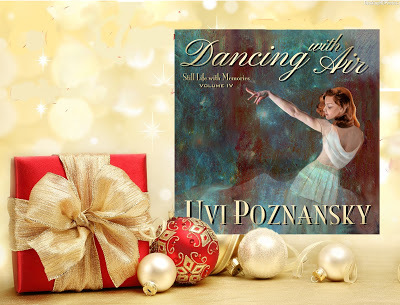
★ Love reading? Give yourself a gift ★Still Life with MemoriesVolume IV: Dancing with Air Free with Kindle Unlimited
Ebook: KindlePaperback: Amazon ★ Barnes&Noble
Audiobook: Amazon US ★ Amazon UK ★ Audible ★ iTunes

"The writing of this intense story of love and heartbreak is what makes it a classic. You'll go through the wringer with this one, but you'll never forget it." ~ J.A. Schneider, author
Natasha, the renowned pianist suffering from early-onset Alzheimer's in my book Apart from Love (volume I and II of the series, woven together) kept coming back to haunt me. Her character was not an easy one to develop. The primary challenge is that she has no voice. She is utterly silent, which makes her son Ben hope—at first—that she can be reached, that he can 'save' her.
“There is no way to tell if she has heard me. Her gaze is fixed, as steadily as before, on the same small pane of glass, through which the sun is blazing; which makes it hard to figure out what she sees out there. I push forward, aiming to view it, somehow, from her angle, which at first, is too hard to imagine: In my mind I try, I see a map, the entire map of her travels around the world. A whole history. It has been folded over and again, collapsed like a thin tissue, into a square; which is suspended there—right in front of her—a tiny, obscure dot on that window. And inside that dot, the path of her journey crisscrosses itself in intricate patterns, stacked in so many papery layers. And the names of the places, in which she performed back then, in the past—London, Paris, Jerusalem, San Petersburg, New York, Tokyo—have become scrambled, illegible even, because by now, she can no longer look past that thing, that dot. She cannot see out of herself. She is, I suppose, confined.”
My novel, The Music of Us (volume III in the series) gives voice to her.
“Once I find my way back, my confusion will dissipate, somehow. I will sit down in front of my instrument, raise my hand, and let it hover, touching-not-touching the black and white keys. In turn they will start their dance, rising and sinking under my fingers. Music will come back, as it always does, flowing through my flesh, making my skin tingle. It will reverberate not only through my body but also through the air, glancing off every surface, making walls vanish, allowing my mind to soar.
Then I will stop asking myself, Where am I, because the answer will present itself at once. This is home. This, my bench. The dent in its leather cushion has my shape. Here I am, at times turbulent, at times serene. I am ready to play. I am music.”
This novel starts out at 1970, when she starts to succumb to her illness, and goes a generation back, to 1941, the time that she and Lenny first fell in love. This is the story of their love.
And the next in the series, my WWII Romantic Suspense novel Dancing with Air, shows her at her peak, back in the months leading to D-Day:
Then—just over the plaintive bleating of the sheep and the chaotic blasts rocking the mine—came a different sound. I listened to it in disbelief. It was the most wonderful sound in the entire world: a hum, the low, familiar hum of my Harley.There it was, a silhouette of the beast, with Natasha astride on top of it, hair unfurling in the wind. I wanted to tell her how I admired her courage, the risk she took, riding it here all by herself, without my guidance, to get here. I wanted to tell her she should have stayed away. But by now I knew that for me, she would dare take any chance, come what may.“Oh Lenny,” she said. “You look... I have no words for it.”Overcome with sudden joy I staggered towards her.“Come on,” she said. “Let’s go.”In confusion I asked, “Where to?”And Natasha said, “Anywhere, my love. Anywhere but here.”

★ Love reading? Give yourself a gift ★Still Life with MemoriesVolume IV: Dancing with Air Free with Kindle Unlimited
Ebook: KindlePaperback: Amazon ★ Barnes&Noble
Audiobook: Amazon US ★ Amazon UK ★ Audible ★ iTunes

"The writing of this intense story of love and heartbreak is what makes it a classic. You'll go through the wringer with this one, but you'll never forget it." ~ J.A. Schneider, author
Published on December 13, 2017 15:00
I was puzzled at the craziness in this place
If you can not see this chirbit, listen to it here https://chirb.it/fAcGyf
I spotted haystacks at the edge of a distant field and pictured myself lying there in the hay with my sweetheart, weaving flowers in her wavy, red hair. I watched the sky darkening and imagined her in my arms. If this were a time of peace, we would gaze together at the stars, rising ever so slowly over both of us. Above me, birds were chirping as they flew over mud, blood and the stench of dead bodies. I was puzzled at the craziness in this place, where beauty coexisted, strangely enough, with horrific ugliness. For a moment, I recalled the stories my dad had told me about trench warfare, dating back to his service in the First World War. Unprotected from rain, snow, and cold, many of the trenches had been continually flooded, exposing the troops to frostbites. With swollen feet, he had waded through water, surrounded by a multitude of frogs and faced with the nightmarish sight of red slugs and beetles with weird horns, all wriggling along the ledges. And then, the rats... Large and utterly fearless, they had invaded the foxholes. Feeding upon the dead had made them contemptuous of the living. I stretched out as best I could at the bottom of my trench and relaxed into feeling lucky. Of course, Natasha would be horrified to learn that my temple had been grazed, earlier that day, by a bullet—but unlike what my father had gone through, my discomfort was not amplified by the ravages of winter.The mound just ahead of me was in bloom. It was springtime. For that, and for the rustle of her letter in my breast pocket, which brought her closer to me, I felt grateful.
Lenny in Marriage before Death

★ Love reading? Treat yourself to a gift ★Still Life with Memories
Volume V: Marriage before DeathEbook: Kindle ★ Nook ★ Apple ★ Kobo ★ Google Play ★ SmashwordsPaperback: Amazon ★ Barnes&NobleAudiobook: Amazon US ★ Amazon UK ★ Audible ★ iTunes

Ms. Poznansky has done it again, but this time—and I don’t say this lightly—she has written my favorite book to date in her stable of literary gems."
~Aaron Paul Lazar, Author
I spotted haystacks at the edge of a distant field and pictured myself lying there in the hay with my sweetheart, weaving flowers in her wavy, red hair. I watched the sky darkening and imagined her in my arms. If this were a time of peace, we would gaze together at the stars, rising ever so slowly over both of us. Above me, birds were chirping as they flew over mud, blood and the stench of dead bodies. I was puzzled at the craziness in this place, where beauty coexisted, strangely enough, with horrific ugliness. For a moment, I recalled the stories my dad had told me about trench warfare, dating back to his service in the First World War. Unprotected from rain, snow, and cold, many of the trenches had been continually flooded, exposing the troops to frostbites. With swollen feet, he had waded through water, surrounded by a multitude of frogs and faced with the nightmarish sight of red slugs and beetles with weird horns, all wriggling along the ledges. And then, the rats... Large and utterly fearless, they had invaded the foxholes. Feeding upon the dead had made them contemptuous of the living. I stretched out as best I could at the bottom of my trench and relaxed into feeling lucky. Of course, Natasha would be horrified to learn that my temple had been grazed, earlier that day, by a bullet—but unlike what my father had gone through, my discomfort was not amplified by the ravages of winter.The mound just ahead of me was in bloom. It was springtime. For that, and for the rustle of her letter in my breast pocket, which brought her closer to me, I felt grateful.
Lenny in Marriage before Death

★ Love reading? Treat yourself to a gift ★Still Life with Memories
Volume V: Marriage before DeathEbook: Kindle ★ Nook ★ Apple ★ Kobo ★ Google Play ★ SmashwordsPaperback: Amazon ★ Barnes&NobleAudiobook: Amazon US ★ Amazon UK ★ Audible ★ iTunes

Ms. Poznansky has done it again, but this time—and I don’t say this lightly—she has written my favorite book to date in her stable of literary gems."
~Aaron Paul Lazar, Author
Published on December 13, 2017 13:59
December 12, 2017
You wouldn’t understand it
I considered asking Natasha to play something for me, but didn’t. Instead I bent over the top of the piano, where the bust of Beethoven was perching, and touched my cheek to the cold reflection.This time Natasha lifted her face to me. I plopped next to her on the bench and reached for her hand. Expecting no answer I said, “This place seems so empty, all of a sudden.”To my surprise she looked around and said, “So it does.”“He’s gone.”“Who?” “Ben.”“Oh,” she said.“I put him on the bus and waved goodbye to him.”At that, she fell silent. A moment later she whispered, “Don’t I know how it feels.”“You do? Really?” I asked. “What is it, exactly, that you feel?”She shrugged.“Tell me, Natasha.”“You wouldn’t understand it.”“Try me.”The phone started ringing just as she was about to tell me something. When I got up to answer, she waved her hand, which I understood, somehow, even without words. Oh, never mind. And as I lifted the receiver from its cradle I heard her mumbling something behind me, back in the living room. I held my breath, trying to catch the sound of her voice. “Can’t you tell?” she said, to no one in particular. “I feel loss.”For a moment I thought she was talking about our son, leaving us, or else about me, having an affair. Perhaps it made her stop calling me Lenny, which irked me. That, I thought, was why she treated me as a stranger. “Is he blind?” She shook her head in disbelief. “Can’t this man read my face? I feel as if I put my brain on a bus and waved goodbye to it.”
Lenny in The Music of Us
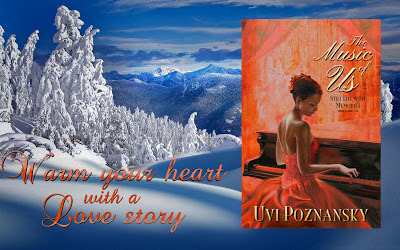
"A powerful and poignant novel that will grip at your heart strings ... a love story that invites the reader into a romance..." - Chief, USN Ret...VT, Top 500 Reviewer

★ Love reading? Treat yourself to a gift ★Still Life with Memories
Volume III: The Music of UsEbook: Kindle ★ Nook ★ Apple ★ Kobo ★ Google Play ★ SmashwordsPaperback: Amazon ★ Barnes&NobleAudiobook: ★ Amazon ★ Audible ★ iTunes
Lenny in The Music of Us

"A powerful and poignant novel that will grip at your heart strings ... a love story that invites the reader into a romance..." - Chief, USN Ret...VT, Top 500 Reviewer

★ Love reading? Treat yourself to a gift ★Still Life with Memories
Volume III: The Music of UsEbook: Kindle ★ Nook ★ Apple ★ Kobo ★ Google Play ★ SmashwordsPaperback: Amazon ★ Barnes&NobleAudiobook: ★ Amazon ★ Audible ★ iTunes
Published on December 12, 2017 12:21
December 11, 2017
Music and war, love and memory, and more
I am thrilled to find a five-star review for my WWII spy thriller, Marriage before Death. The review written by top Amazon reviewer and author Sheila Deeth. In addition to her novel, Divide by Zero, she has written The Five Minute Bible Story Series, and other books. With a Masters in mathematics from Cambridge University, England, she is a a top reviewer for Amazon, Goodreads, Gather and other reading sites. This is what she says:
4.0 out of 5 stars Music and war, love and memory, and moreBySheila DeethVINE VOICEon December 10, 2017Format: Kindle Edition|Verified Purchase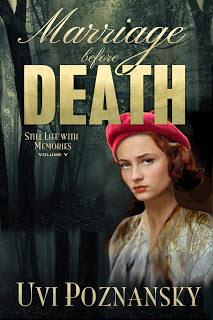 Fifth in the Still Life with Memories series, Marriage before Death takes readers to the dangerous small towns of France just after D-Day. The German occupation is failing, and those in the resistance find their lives increasingly in peril. But what of resisters who aren’t even French, who might be labeled spies and be betrayed for the price of a life or a hat? And what of those who meet in surprise, neither knowing the other would be there?
Fifth in the Still Life with Memories series, Marriage before Death takes readers to the dangerous small towns of France just after D-Day. The German occupation is failing, and those in the resistance find their lives increasingly in peril. But what of resisters who aren’t even French, who might be labeled spies and be betrayed for the price of a life or a hat? And what of those who meet in surprise, neither knowing the other would be there?
Knowing the future adds an interesting poignancy to stories from the past. Readers know from the start that Natasha’s memories are fading. But Lenny’s memories are clouded only by love and uncertainty. As the characters play their different roles, the question of who is real, what memories are true, and what constitutes personality lie in the background, enriching every step of the path.
The writing is musical, as befits a tale with a musical protagonist. The story is intriguing with some sweetly touching scenes. While the reader will guess before the characters what’s going to happen, there’s always that interesting question of memory and reality. A cool addition to the series, and an enjoyable glimpse of different times and lives, I enjoyed Marriage before Death and I’m eager for more.
Disclosure: I already love the series and I got this one on a deal.
4.0 out of 5 stars Music and war, love and memory, and moreBySheila DeethVINE VOICEon December 10, 2017Format: Kindle Edition|Verified Purchase
 Fifth in the Still Life with Memories series, Marriage before Death takes readers to the dangerous small towns of France just after D-Day. The German occupation is failing, and those in the resistance find their lives increasingly in peril. But what of resisters who aren’t even French, who might be labeled spies and be betrayed for the price of a life or a hat? And what of those who meet in surprise, neither knowing the other would be there?
Fifth in the Still Life with Memories series, Marriage before Death takes readers to the dangerous small towns of France just after D-Day. The German occupation is failing, and those in the resistance find their lives increasingly in peril. But what of resisters who aren’t even French, who might be labeled spies and be betrayed for the price of a life or a hat? And what of those who meet in surprise, neither knowing the other would be there?Knowing the future adds an interesting poignancy to stories from the past. Readers know from the start that Natasha’s memories are fading. But Lenny’s memories are clouded only by love and uncertainty. As the characters play their different roles, the question of who is real, what memories are true, and what constitutes personality lie in the background, enriching every step of the path.
The writing is musical, as befits a tale with a musical protagonist. The story is intriguing with some sweetly touching scenes. While the reader will guess before the characters what’s going to happen, there’s always that interesting question of memory and reality. A cool addition to the series, and an enjoyable glimpse of different times and lives, I enjoyed Marriage before Death and I’m eager for more.
Disclosure: I already love the series and I got this one on a deal.
Published on December 11, 2017 18:50
December 9, 2017
A fascinating and well-crafted family saga
It's wonderful to find a new review by Piaras for The White Piano:
5.0 out of 5 stars A fascinating and well-crafted family sagaByPiarason December 6, 2017Format: Kindle Edition|Verified Purchase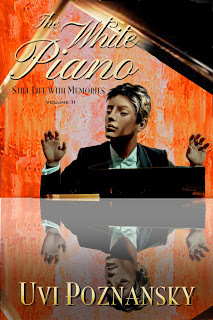 Uvi Poznansky is an accomplished author, poet and artist, and any ink that flows from her pen is highly recommended reading. This work, The White Piano (Still Life with Memories Book 2), is no exception.
Uvi Poznansky is an accomplished author, poet and artist, and any ink that flows from her pen is highly recommended reading. This work, The White Piano (Still Life with Memories Book 2), is no exception.
Captivating and commendable, this work had me immersed from the beginning. The story flowed from scene to scene with ease, and the author shows exceptional ability when it comes to storytelling. There are plenty of attention-grabbing moments in this page turner that will take the reader on a truly mesmerizing journey!
It’s one of those books that come along occasionally that makes you want to read it non-stop until you get to the end. I’m giving nothing further away here. And this, I hope, will only add to the mystery and enjoyment for the reader. A well-deserved 5 stars and a highly recommended read.
5.0 out of 5 stars A fascinating and well-crafted family sagaByPiarason December 6, 2017Format: Kindle Edition|Verified Purchase
 Uvi Poznansky is an accomplished author, poet and artist, and any ink that flows from her pen is highly recommended reading. This work, The White Piano (Still Life with Memories Book 2), is no exception.
Uvi Poznansky is an accomplished author, poet and artist, and any ink that flows from her pen is highly recommended reading. This work, The White Piano (Still Life with Memories Book 2), is no exception.Captivating and commendable, this work had me immersed from the beginning. The story flowed from scene to scene with ease, and the author shows exceptional ability when it comes to storytelling. There are plenty of attention-grabbing moments in this page turner that will take the reader on a truly mesmerizing journey!
It’s one of those books that come along occasionally that makes you want to read it non-stop until you get to the end. I’m giving nothing further away here. And this, I hope, will only add to the mystery and enjoyment for the reader. A well-deserved 5 stars and a highly recommended read.
Published on December 09, 2017 18:50



